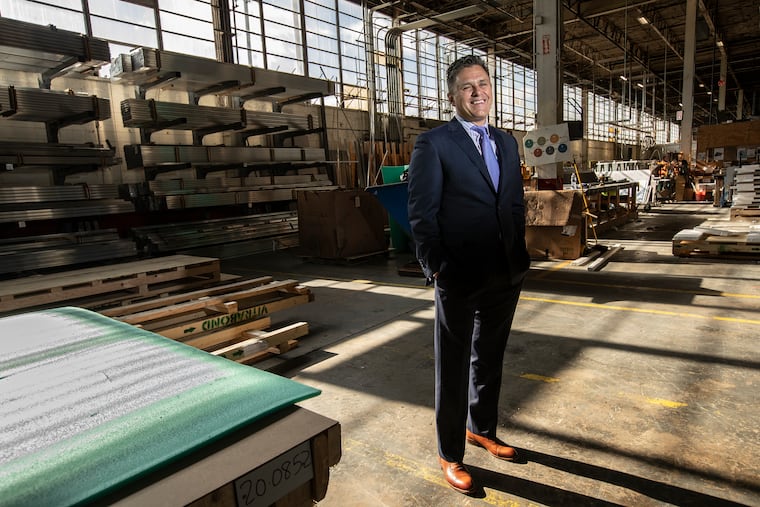EDA Contractors’ Edward DeAngelis on how he instills emotional intelligence in employees
Edward DeAngelis, owner of EDA Contractors, on how his leadership has changed how his company functions, and how his employees work, think and feel.

In the stereotypically macho world of roofing, EDA Contractors stands out. Edward DeAngelis, a La Salle College High School and St. Joseph’s University grad, founded EDA in 1999, after about a decade in the roofing business. Today, he leads an all-local workforce in installing roofs from Maryland to New York. What makes the company stand out is its intentional cultivation of culture, exemplified by DeAngelis’ implementation of emotional intelligence training for all employees. Here, DeAngelis, who was chosen the top leader of a mid-sized company based on employee responses to the 2020 Inquirer Top Workplaces survey, talks about how his innovative leadership has changed how his company functions.
Why did you start your own business?
When I was a kid, I was a paperboy, and that really helped mold me in a way. I grew up in a rowhome in Philly. Delivering papers before school in the morning made me feel independent. It also gave me a first taste of making my own money.
How has COVID-19 uniquely affected your company, and how have your employees responded?
The suddenness of the shutdown due to the pandemic was especially difficult for our staff and executive management. Since 50% of our business was deemed essential, we were forced into creating plans and methods to keep our frontline workers safe while caring for the other 50% that could not work. EDA currently works in four bordering states (Pa., Del., N.J., N.Y.) that all have different criteria and rules, so our team must be aware of each state’s mandate.
We have had to work differently and inefficiently due to the many protocols that must be followed to help mitigate the spread of this disease. The government’s loans have been extremely helpful to offset the additional material costs of wash stations, hand sanitizers, face coverings, face shields, and all other COVID-19 protections. The loans have allowed us to maintain our office staff without any furloughs.
Before COVID-19, what fueled your successful growth strategy?
I can’t tell you that I have a magic wand that makes growth happen. Some of it’s luck. Some of it’s opportunity. Some of it is: I didn’t pay attention to growth; I paid attention to doing the best we could do in what we were doing.
How did EDA’s culture develop?
Anybody who starts a business, at one point, you’re scared to death to go bankrupt. You’re scared to death it isn’t going to work. But then, you’re past that and arrive at, ‘What else do I want?’ I decided I wanted to create community. Community feels real to me.
What is the culture like now?
We have a culture team [that does] nothing but try to understand the pulse of what’s going on within the company. We have a fun committee. We have champions who are constantly looking out for what’s going on here, what are we doing right, what are we doing wrong, how can we keep improving.
We do charitable work, but not for fanfare. We do it because we’re lucky to be where we are, so we can see something else out there. Charitable work lends to our culture, our values; it reminds us of the things that we really care about.
How does EDA’s emotional intelligence training fit into all of this?
Emotional intelligence is a buzzword right now, but the reality is, it really works. Ten years ago, we hired consultants to come and teach us. When we started out, people resisted. They were like: ‘What is this?’ What they realized is, [developing emotional intelligence] is really, really hard.
How does it work?
Everyone gets a copy of Emotional Intelligence 2.0 [by Travis Bradberry and Jean Greaves]. Then, we do assessments. We speak about breathing. We speak about how our brains work. We have small group discussions. Since conflict is something we deal with every day, that’s what we train on.
What have been the results?
Some of the best results we’ve gotten have come from the most unlikely individuals. They’re tatted up. They’re men. They’re in construction. They need to know what they’re doing is important, that it has value, and that it can be dangerous. If we can get them to understand how they feel, if they can get rid of this idea that they can’t be vulnerable, then they realize emotional intelligence work isn’t touchy-feely — it’s badass.
Can you measure ROI on your emotional intelligence work?
Our safety is much better. Our retention is excellent. A lot of people want to come work here. We have a consistent profit margin. But it isn’t a home run. It’s a long play. If you want to do emotional intelligence, you’ve got to stick with it.